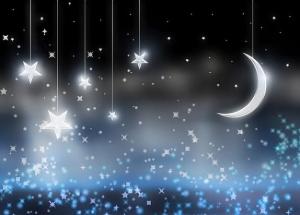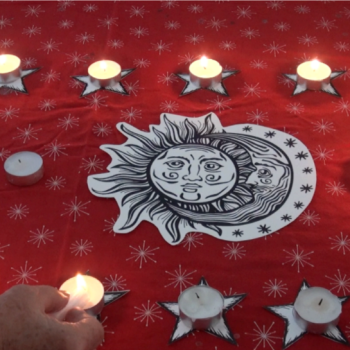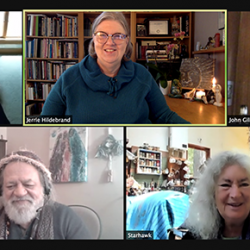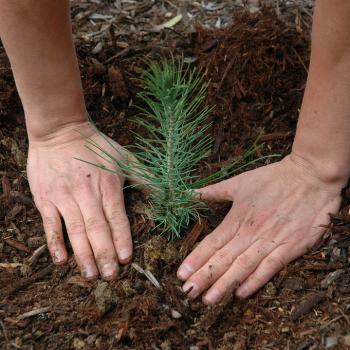Winter Solstice season is a special time for all of us. Though the exact Solstice has passed, the influence of the dark season continues for quite some time. Some say until the Spring Equinox. While celebrating the return of the light is the conventional approach to the Winter Solstice, I along with a growing number of pagans celebrate the darkness during the winter months. In the winter in the Northern Hemisphere we are in the height of darkness. In a cave we are in darkness. These are among the most sacred times and places for many ancient cultures. At Summer Solstice and during the summer months I celebrate the light. This approach for me honors the rhythms of nature.
The difference in practice stems from how dark is defined. It is my belief that because we Unitarian Universalists hold the “free a nd responsible search for truth and meaning” as one of our principles, our faith demands we take up the conversation about the true meaning of darkness.
nd responsible search for truth and meaning” as one of our principles, our faith demands we take up the conversation about the true meaning of darkness.
For many in Western culture the word dark connotes evil, shadow, unwanted, undermining the positive and on and on. I am of the mind, along with many civil rights leaders and sister feminists that this definition originates in racist and misogynist attitudes. I also feel that if we look more closely at these conventionally accepted assumptions, we will quickly understand that an accurate definition of dark removes this negativity.
Margot Adler, the esteemed thinker, commentator, pagan leader and Unitarian Universalist once said she became a UU because she valued scientific, rational thought, our humanist-credited source. I too value reason and the results of science and have discovered they are part of earth-centered traditions as well as humanism. So, I have to ask, is it rational and scientific to call darkness evil? Is the dark, fecund earth evil? Do the roots that grow in the dark cause
great distress? Or are they the very basis of survival? When viewed from this perspective, the answer becomes obvious.
The reasons the dark has taken on such a pejorative connotation are complex. For me, they have a lot to do with three sociological/psychological realities in modern culture: dismissal of basic emotional needs; racist attitudes toward Africa and the cultures fostered by the African diaspora; and misogynist feelings toward women because of their dark wombs, the original chalice.
I was pleased to attend a Winter Solstice service this year at the Unitarian Universalist Church of the Monterey Peninsula entitled Days of Light and Dark conducted by the church’s CUUPS chapter and the Youth Group. The balance between Dark and Light was the overarching message of this service. I was proud to see that paganism was embracing this conversation at this local congregation.
The service contained several views of the dark. Religious Education Director Shams Cohen in her homily pointed out the misconceptions about the dark so many of us have come to incorporate in our everyday usage. It was refreshing to see the issue of Dark and Light engaged in a way that called out these assumptions.
The psychological role of the dark was celebrated. We sang the song by Rev. Mary Grigolia entitled The Dark which was part of the Rise Up and Call Her Name curriculum. In the song, we imagine what dark can do for us. The refrain is “The darkness takes courage, the darkness takes time, living in the darkness takes a different state of mind. The darkness knows healing, the darkness knows change. Oh, Mother Darkness, I return to you again.”
I personally feel the dark refers to reflective, introspective searching that supports emotionally expressive aspects of the human personality. Dark times are also times of rest. To endarken is to bring fullness to life that is missing when we are in perpetual motion. Too often in our hyperactivity we perceive the dark, non-structured or undirected mindset as depression. When we are going through a necessary time of inactivity we panic, rather than allow our deeper selves, sometimes called the subconscious, to do its work in the absence of conscious processing.
The winter months then, for me, are joyful because I am drawn into my soulful self, a space of richness. My pagan beliefs and my feminist perspective hold this truth: value both the space and the form. When we open to a feeling of just being, not doing, something dubbed intuition often comes into play in a big way. The basis of what is to come into form often emerges out of these quiet, still moments bringing peace and satisfaction, the greatly celebrated qualities of the Winter Solstice season.
This does not mean I devalue the light. In my version of earth-based spirituality each has an honored place in the interconnected web. The service emphasized this view as we ended with the chant Mother of Darkness, Mother of Light which goes: “Mother of darkness, mother of light. Earth beneath our souls in flight. Songs of love and love of life. Guide us to our hearts.”
As UUs we believe in shaping our own belief systems informed by a set of principles. This allows us to reclaim the true meaning of the word dark by re-educating ourselves and the larger culture—highlighting the deep, dark, fertile, supportive, nurturing and jazzy aspects of the Beautiful Darkness. May we all in this time when the great turning of the seasons take place, benefit from reclaiming the true power and essence of the Dark Time and to work to increase understanding of how the misuse of language can perpetuate suffering and social injustice.
(In Parts 2 and 3 of Honoring the Dark I will deal with racism and misogyny as they contribute to our misconceptions about dark. I will explore how UU paganism is positioned to make significant contributions to personal and social healing by promoting redefinitions of the word dark that are accurate and just.)













